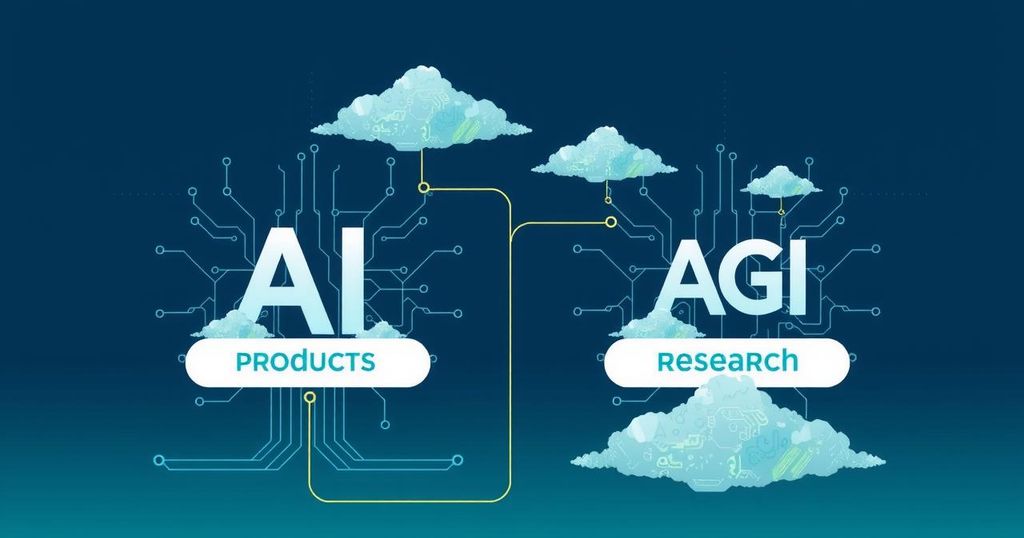Meta Restructures AI Division: Focus on AGI and Product Development
Meta is restructuring its AI division into two units: AI Products and AGI Foundations, led by Connor Hayes for product integration and Ahmad Al-Dahle with Amir Frenkel for AGI research. This move aims to improve performance and retention amid a backdrop of technical struggles and talent exodus, while challenges remain in gaining enterprise trust and demonstrating compliance. Experts warn that structural changes alone won’t resolve Meta’s deeper issues.
In the latest shuffle at Meta, the tech giant is splitting its AI division into two distinct teams: AI Products and AGI Foundations. This restructuring follows an internal memo released by Chief Product Officer Chris Cox. Connor Hayes steps in as the leader for AI products, while Ahmad Al-Dahle and Amir Frenkel will co-lead the AGI research efforts. This move is seen as crucial since Meta is in a fierce competition with other companies like OpenAI and Google.
Meta’s decision to reorganize appears to be influenced by various crises, including issues with the upcoming Llama 4 Behemoth model and key team defections to rivals like Mistral AI. It’s not the first time Meta has revamped its strategy; remember CEO Mark Zuckerberg’s push in 2023 to hasten generative AI advancements. Unfortunately, that attempt didn’t really get them where they wanted to go, leaving them somewhat behind their competitors, despite initial enthusiasm.
“Structural changes alone won’t solve Meta’s AI challenges,” commented Amandeep Singh from QKS Group. He pointed out that while the new AGI Foundations unit clarifies the focus, effectively holding onto top talent hinges on having a clear path from research to practical deployments. Meta has grappled with merging priorities and managing fragmented processes.
On the talent front, the company has seen significant departures, especially from their Llama research team. From the original 14 members, only three now remain, which, according to Business Insider, highlights some deeper issues in Meta’s strategy. Employee morale appears low, driven by reports of limited resources and slow advancements. “Talent follows momentum, and right now, momentum lives where research decisions directly shape deployed capabilities,” Singh noted, underscoring the urgency.
Technical setbacks are also part of the story. The struggling Llama 4 model hasn’t been performing well, particularly with tasks that require reasoning and math skills. It’s a bit of a mess, really, and while Meta had some advantages in open-source knowledge, they’re now scrambling to keep pace with competitors in developing AGI.
Despite this situation, the company is trying to lure developers with initiatives like Llama for Startups and the recent Llama API launch. Still, industry analysts warn that these plans may not be enough to gain trust within enterprise markets. There’s hesitation, and with good reason.
Companies appreciate Llama’s lower prices, but they’re increasingly concerned about governance issues and an impending copyright lawsuit related to training data. “While Llama’s cost is attractive, growing safety gaps and legal concerns are hard to ignore,” Singh pointed out. For businesses relying on mission-critical applications, many might ultimately prefer more dependable but pricier options like GPT or Gemini.
Moreover, Meta is facing a credibility problem. Its sales framework and regulatory compliance record lag behind competitors like Microsoft with its OpenAI or Google’s Vertex AI. Singh emphasized, “Enterprise AI adoption hinges on proven compliance frameworks, operational reliability, and mature support systems. Meta still needs to build that trust at Fortune 500 scale.”
Looking forward, Meta is focusing on creating models with reasoning, multimedia capabilities, and voice functions. This aligns with the industry movement towards multimodal AI as a means of driving enterprise transformation. Surjyadeb Goswami from IDC Asia Pacific stated that open-source models play a critical role in enabling cost-effective and transparent deployment initiatives.
To truly make a mark in AGI, Meta has got to work on rebuilding trust, particularly for wider enterprise acceptance. Singh remarked on the need for community stewardship akin to Linux, rigorous safety protocols resembling OpenAI’s, and effective enterprise tools. “Balancing openness with responsibility is Meta’s real challenge, especially as models get closer to general-purpose cognitive abilities.”
Ultimately, Meta has to demonstrate that this reorganization can lead to tangible improvements in model performance, retain talent better, and boost enterprise adoption to restore confidence in its revised strategy. “Meta’s open-source vision is ambitious, but execution must be the name of the game,” Singh concluded.
Meta is undergoing a significant restructuring of its AI division, splitting it into AI Products and AGI Foundations to better compete with rivals like OpenAI and Google. The company is attempting to mitigate talent losses and technical setbacks while tackling issues around enterprise trust and governance. Analysts caution that just reorganizing won’t necessarily solve Meta’s ongoing challenges, especially in building a robust sales and compliance framework to attract enterprise clients. Success lies in executing this new strategy effectively, balancing openness with reliability and fostering a culture of innovation.
Original Source: www.computerworld.com




